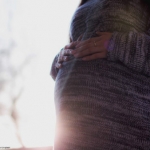Previous studies have suggested that infant sleep problems are related to maternal sleep disruption, mood symptoms, and/or anxiety. There is additional evidence indicating that sleep problems in the infant may increase risk for postpartum depression and anxiety. There is a complex interplay between infant sleep and maternal sleep and mental health, and a better understanding of these relationships may help to design interventions which improve maternal well-being , as well as infant sleep quality. Two recent studies explore the relationship between sleep, biological rhythms, and maternal mood and anxiety.
Circadian Rhythms and Mood Symptoms
In the first study, Slyepchenko and colleagues investigate the link between objective parameters of sleep and biological rhythms with mood and anxiety symptoms in the mother. They prospectively followed subjective and objective measures of sleep and biological rhythms and light exposure from late pregnancy into the postpartum period and their relationship with depressive and anxiety symptoms across the peripartum period.
In this study, 100 women recruited from the community and outpatient obstetric clinics were assessed during the third trimester of pregnancy; 73 returned for follow-ups at 1-3 weeks and 6-12 weeks postpartum. Subjective and objective measures of sleep and biological rhythms were obtained, including two weeks of actigraphy at each visit. Validated questionnaires were used to assess mood and anxiety.
The researchers observed discrete patterns of longitudinal changes in sleep and biological rhythm variables from the third trimester into the postpartum period, such as fewer awakenings and increased mean nighttime activity during the postpartum period compared to pregnancy. Specific longitudinal changes in biological rhythm parameters were most strongly linked to higher levels of depressive and anxiety symptoms across the peripartum period, most notably circadian quotient, activity during rest at night, and probability of transitioning from rest to activity at night.
This study indicates that a specific pattern of biological rhythm variables, in addition to sleep quality, were closely associated with the severity of depressive and anxiety symptoms across the peripartum period. Specifically, higher circadian quotient (CQ), which is a measure of circadian rhythm strength, and higher ?R night (a measure of mean activity during rest states at night) were strongly linked to higher depressive symptoms. What this suggests is that individuals with more robust daily rhythms before delivery (those with higher CQ) typically exhibit more mood stability; hoever, they may have more difficulty tolerating disruptions in sleep and circadian rhythms that occur while taking care of a newborn and may be more vulnerable to postpartum depressive symptoms.
Infant Sleep and Maternal Sleep and Mood
In the second study (from Lin and colleagues), a total of 513 pairs of parents and infants were enrolled in a prospective cohort study. Maternal mood, anxiety symptoms and sleep were assessed using validated questionnaires, including the Pittsburgh Sleep Quality Index during the third trimester and within three months of delivery. Infant sleep was assessed using the Brief Screening Questionnaire for Infant Sleep Problems within 3 months of birth.
In this cohort, sleep problems were observed in 40.5% of infants between 0 and 3 months of age. Risk factors for infant sleep problems included lower education level of the father, paternal depression, maternal postpartum depression and/or anxiety, and maternal sleep problems during the postpartum period.
In addition, this study examined expression of glucocorticoid receptors (GR), melatonin receptors (MR), exchange proteins directly activated by cAMP (EPAC) receptors, and dopamine receptors (DR) in the placenta. The researchers observed no differences in placental expression of DR, GR, MR, and EPAC when comparing mothers who had infants with or without sleep disorders.
The researchers also measured methylation of the promoter regions for the GR (NR3C1 and NR3C2), MR (MTNR1A and MTNR1B), EPAC (RASGRF1 and RASGRF2), and DR (DRD1 and DRD2) genes. Methylation of MTNR1B, a promoter region of the melatonin receptor, was higher and expression of MR was lower in the placenta of mothers with sleep problems during the third trimester compared to mothers without sleep disorder. In addition, levels of methylation ot the NR3C2 promoter was lower and GR expression was higher in the placenta of mothers with sleep disorder extending from the third trimester to postpartum than in mothers without sleep disorder.
The authors hypothesize that maternal sleep problems emerging during the third trimester could lead to decreased melatonin receptor expression by up-regulating MTNR1B methylation, and then resulting in elevated cortisol and increased glucocorticoid receptor expression by down-regulating NR3C2 methylation, which could increase the incidence of maternal postpartum sleep disruption. Subsequently, maternal sleep problems persisting into the postpartum sleep disturbance could result in increased vulnerability to postpartum mood changes and infant sleep problems.
Although this study did not look at breastfeeding status, other studies have demonstrated that melatonin in the mother’s breast milk helps regulate infant sleep-wake cycles and circadian rhythms. If maternal melatonin levels are lower in the mother, this deficit may impede the regulation of circadian rhythms in the infant.
Practical Implications
In all pregnant women, studies have demonstrated worsening of sleep quality across pregnancy and into the postpartum period, particularly during the third trimester of pregnancy and the first month postpartum. However, understanding how these longitudinal changes in biological rhythms and sleep patterns across the peripartum period affect vulnerability to postpartum mood and anxiety is not fully understood. While all women caring for newborn infants experience some degree of disruption, it appears that a subset of these women (i.e., those with more significant changes in sleep during the third trimester and/or early postpartum period and those with stronger daily circadian rhythms) may be more vulnerable to depression and anxiety during the postpartum transition.
Based on these findings, women should be assessed for sleep problems during late pregnancy and the postpartum period. There are a number of questionnaires used to assess sleep quality and daytime functioning; while most of these are relatively long, the Insomnia Severity Index or ISI is a relatively straightforward, 7-iten, self-rated questionnaire. Question 7 of the EPDS asks about sleep in the context of depressive symptoms: “I have been so unhappy that I have had difficulty sleeping”. Item 3 on the PHQ-9 (“Trouble falling or staying asleep, or sleeping too much?”) asks about sleep and is consistent with total score on the ISI.
Given the correlation between maternal sleep and depressive symptoms, individuals reporting sleep problems should also be screened for depression and anxiety.
Given the bidirectional nature of infant sleep problems and maternal mood and sleep disorders, in a pediatric setting, when parents report infant sleep concerns or problems, mothers should be evaluated for depression, anxiety, and/or sleep disorders. Even before sleep problems occur, psychoeducational interventions which teach new parents about infant sleep may reduce risk of postpartum depression.
Sleep interventions should be considered in individuals who present with sleep problems during pregnancy or the postpartum period. Cognitive behavioral therapy for insomnia (CBT-I) is an effective, non-pharmacological option for sleep problems during pregnancy and the postpartum period. Previous studies have indicated that interventions improving sleep in the mother decrease risk for postpartum depression.
Ruta Nonacs, MD PhD
References
Lin X, Zhai R, Mo J, Sun J, Chen P, Huang Y. How do maternal emotion and sleep conditions affect infant sleep: a prospective cohort study. BMC Pregnancy Childbirth. 2022 Mar 23; 22(1):237.
Slyepchenko A, Minuzzi L, Reilly JP, Frey BN. Longitudinal Changes in Sleep, Biological Rhythms, and Light Exposure From Late Pregnancy to Postpartum and Their Impact on Peripartum Mood and Anxiety. J Clin Psychiatry. 2022 Jan 18; 83(2):21m13991.








Leave A Comment